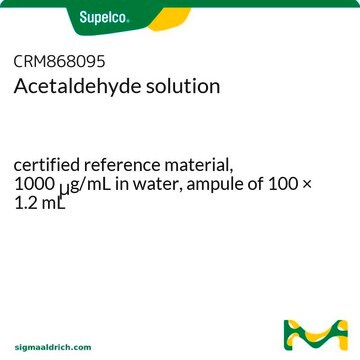W200379
Acetaldehído solution
40 wt. % in H2O
About This Item
Productos recomendados
origen biológico
synthetic
Nivel de calidad
cumplimiento norm.
FDA 21 CFR 177.2410
FDA 21 CFR 182.60
Formulario
liquid
concentración
35.00-45.00% (titration by hydroxylamine)
40 wt. % in H2O
índice de refracción
n20/D 1.3771
densidad
0.868 g/mL at 20 °C
aplicaciones
flavors and fragrances
Documentación
see Safety & Documentation for available documents
alérgeno alimentario
no known allergens
Organoléptico
ethereal
cadena SMILES
[H]C(C)=O
InChI
1S/C2H4O/c1-2-3/h2H,1H3
Clave InChI
IKHGUXGNUITLKF-UHFFFAOYSA-N
¿Está buscando productos similares? Visita Guía de comparación de productos
Cláusula de descargo de responsabilidad
Palabra de señalización
Danger
Frases de peligro
Consejos de prudencia
Clasificaciones de peligro
Carc. 1B - Eye Irrit. 2 - Flam. Liq. 2 - Muta. 2 - STOT SE 3
Órganos de actuación
Respiratory system
Código de clase de almacenamiento
3 - Flammable liquids
Clase de riesgo para el agua (WGK)
WGK 3
Punto de inflamabilidad (°F)
<-0.0 °F - closed cup
Punto de inflamabilidad (°C)
< -17.78 °C - closed cup
Equipo de protección personal
Eyeshields, Faceshields, Gloves, type ABEK (EN14387) respirator filter
Elija entre una de las versiones más recientes:
¿Ya tiene este producto?
Encuentre la documentación para los productos que ha comprado recientemente en la Biblioteca de documentos.
Los clientes también vieron
Nuestro equipo de científicos tiene experiencia en todas las áreas de investigación: Ciencias de la vida, Ciencia de los materiales, Síntesis química, Cromatografía, Analítica y muchas otras.
Póngase en contacto con el Servicio técnico




